As the daily locally transmitted COVID-19 cases still number in the thousands and the total number of infections shot up to 200,000 in mid-April, Shanghai experienced its worst COVID-19 outbreak in two years. The Omicron variant, which has caused large number of infections in Shanghai, can lead to severe cases and even death, thus not just a “tough flu” as some people mistakenly refer to it, according to medical experts. Data show more than 50 million people aged 60 or above – belonging to the most vulnerable group in China – have not been fully vaccinated against COVID. “In the fight against the virus, the most important human right is the right to life and health,” said Zhong Nanshan, academician of Chinese Academy of Engineering. He then further explained, “Since we can’t allow widespread infections lead to massive numbers of deaths among senior citizens, we still have to stick to the dynamic zero-COVID policy.”

Staff members of the online grocery platform Meituan Maicai sort and pack ordered groceries in east China's Shanghai on April 12, 2022. (Xinhua/Jin Liwang)
If China relaxes its epidemic prevention, the resulting surge of infections might paralyze the medical system, cautioned Ma Xiaowei, director of the National Health Commission (NHC). “The dynamic zero-COVID policy has proven to be the most effective strategy after multiple rounds of hard battles with highly contagious variants,” said Ma, according to a Xinhua report.
Early this year, many countries loosened their COVID containment restrictions, with the consequence being spikes of severe cases and deaths. In Japan, the accumulated deaths caused by COVID-19 from January to March totaled 10,000. In the U.K., since the country announced the plan for living with COVID in February, its epidemic situation has worsened continually with the weekly newly added COVID-19 cases rising to nearly 5 million. On April 6, German Health Minister Karl Lauterbach said his announcement of scrapping obligatory isolation for people infected with COVID was a mistake and sent the wrong signal. "Corona is not a cold," Lauterbach wrote on Twitter, "So there must continue to be isolation after infection, ordered and supervised by health offices."
Data has shown that China’s dynamic zero-COVID policy has effectively contained the virus and ensured continuation of normal life and production in most parts of the country. Being among the first countries that initially brought the pandemic under control and registered a positive economic growth, China logged a GDP growth of 8.1 percent in 2021, the highest among major economies in the world.
Despite the COVID-19 resurgence, investment in China is expected to expand steadily according to the National Development and Reform Commission (NDRC). To underpin the country’s development in 2022, special attention is being given to investment. Official data shows that the national investment in fixed assets increased 12.2 percent year on year in the first two months, 7.3 percentage points higher than last year. Investment in manufacturing and infrastructure has spearheaded that growth. According to a recent NDRC press conference, local government special bonds will play an important role in spurring investment growth this year. In addition, low-carbon projects, emerging industries, and a new type of urbanization will be the key areas for potential investment.
Meanwhile, the COVID-19 resurgence has not dampened foreign investors’ confidence in the Chinese market. Foreign direct investment (FDI) into the Chinese mainland, in actual use, increased by 25.6 percent year-on-year to RMB 379.87 billion in the first quarter of the year according to the Ministry of Commerce (MOC). FDI in high-tech manufacturing grew 35.7 percent over the same period of 2021, while that in the high-tech service sector rose 57.8 percent year-on-year.
Facing mounting pressure induced by the COVID-19 flare-ups in the country which have impacted normal operation and personnel mobility in certain regions, foreign firms still hold optimistic outlooks about China’s sustainable development. According to a Xinhua report, undeterred foreign corporations are advancing new projects in China. The Germany-based technology group Heraeus is pushing forward nearly 10 projects worth around US $200 million in several locations around China. Meanwhile, the Fuling Industrial Food Park, a joint venture with an investment of RMB 7 billion by Europe-based Louis Dreyfus Company (LDC) and Chinese enterprises DONLINK Group and HAID Group, also broke ground in Guangzhou on March 30.
Meanwhile, according to MOC spokesperson Shu Jueting, a special working group for key foreign-funded projects has been set up by the Ministry in cooperation with local authorities to help relevant firms ride out difficulties. "We are helping foreign enterprises, especially those in areas hit hard by COVID-19, to solve problems they encounter in the resumption of work and production, personnel entry into China, as well as logistics and transportation," said Shu.
A range of favorable policies are creating more space for foreign companies’ development in China, such as the trimmed negative lists for foreign investment and implementation of national treatment.
During his inspection tour of south China’s Hainan Province on April 10-13, President Xi Jinping called for accelerating the development of Hainan into a free trade port with Chinese characteristics and global influence, once again showing the country’s determination to further integrate with the world. Xi also encouraged Hainan to build the free trade port into a shining Chinese model in the world, thus making the province a paradigm of the country’s reform and opening-up in the new era.